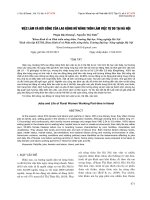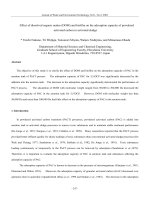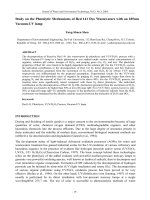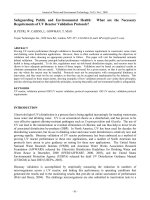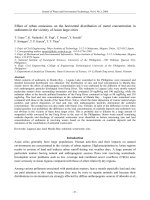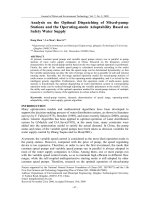- Trang chủ >>
- Khoa Học Tự Nhiên >>
- Vật lý
heidegger martin the fundamental concepts of metaphysics
Bạn đang xem bản rút gọn của tài liệu. Xem và tải ngay bản đầy đủ của tài liệu tại đây (22.68 MB, 200 trang )
Translators' Foreword
The text of Martin Heidegger's 1929-30 lecture course presented here is of
special interest on at least three counts. First, we have a preliminary appraisal
of about 90 pages documenting Heidegger's conception of philosophy and
metaphysics during this period. Developing an adequate concept of what is
meant by the term 'metaphysics' was undoubtedly central to the revision
Heidegger's thought was undergoing around this time-as witnessed by his
inaugural Freiburg lecture "What Is Metaphysicsf't-cand the analyses given
in this 1929-30 course provide us with a detailed insight in this respect. In
particular, they address the relation between MyoC; and
Second, a major part of the interest aroused in this lecture course stems
from its penetrating analyses (covering some 130 pages of German text) of the
mood or "fundamental attunement" [Grundstimmung] of boredom. Prior to
the publication of this course, the only fundamental attunement to receive
detailed treatment from Heidegger was that of anxiety [Angst]. The analysis
of anxiety assumed a pivotal role in his magnum opus Being and Time,2 and
anxiety remained the central focus in "What Is Metaphysics?," manifesting
Dasein (Heidegger's term for human existence with respect to its openness to
being) not so much in terms of the "being held in limbo" [Hingehaltenheit]
that will be shown to characterize the various forms of boredom, but as a
"being held out into the Nothing" [Hineingehaltenheit in das Nichts]. The
prominence of the mood of anxiety in fact led many readers to assume that
there was but one fundamental attunement that could be attributed to Dasein.
In the 1929-30 course, however, Heidegger emphatically denies that this is the
case. Indeed, he already appeals to the attunement of "profound boredom"
in the 1929 inaugural lecture. 3 Furthermore, the recent publication of the early
lecture entitled "The Concept of Time" indicates that Heidegger was well
aware of the possibility of understanding boredom in terms of a lengthening
of time as early as 1924, and perhaps earlier." With respect to the general
I. "Was ist Metaphysik"." delivered 24 July 1929, is published in Wegmarken, Gesamtausgabe,
Vol. 9 (Frankfurt: Klostermann, 1976), pp. 103-22. [Trans. D. F. Krell in Martin Heidegger: Basic
Writings (New York: Harper Collins, 1993), pp. 93-110.]
2. See Sein und Zeit (Tiibingen: Niemeyer, 1979), especially §40. [Trans. J. Macquarrie and E.
Robinson, Being and Time (Oxford: Blackwell, 1987).]
3. "Was ist Metaphysikr," op. cit., p. 110. [Trans. p. 99.]
4. See Der Begriff der Zeit (Tiibingen: Niemeyer, 1989), pp. 19-22. [Trans. W. McNeill, The
Concept of Time (bilingual edition) (Oxford: Blackwell, 1992), pp. 14-17.]
Translators' Foreword
Translators' Foreword
significance of the attunement of boredom for Heidegger's thought, it is worth
remarking that in the mid-1930s boredom comes to be identified by Heidegger
as being "the concealed destination" of modernity in the scientific era.' We
should also note that the concept of the "while" [Weile] which is central to
the investigations on boredom (see below) continued to playa crucial role in
Heidegger's later thinking.
Third, the 1929-30 course shows Heidegger venturing into the realms of
positive science-i-specifically biology-s-and doing so at great length. The move
is astonishing, because Heidegger will nowhere else take the experimental
results of science so seriously in support of possible metaphysical claims. The
engagement with experimental biology occurs in the course of examining the
possibility of an ontology of 'life', the term referring primarily to the 'natural'
life of plants and animals, but also encroaching, uncannily, no doubt, on what
Heidegger, in the 1946 "Letter on Humanism," would call our "scarcely fathomable, abyssal bodily kinship with the animal." The task of elaborating such
an ontology of life is already intimated in Being and Time, where Heidegger
insists that it would have to occur "by way of a privative interpretation,"? yet
the appeal to experimental science is nevertheless unexpected. The difficulty
in understanding animal life, with which Heidegger concerns himself here-s-in
particular the problems involved in differentiating the animal's being from
that of humans-s-is an issue that will continue to appear in Heidegger's later
works, though only by way of much briefer (and eminently problematic)
comments.
Finally, one ought to draw special attention to the concluding analyses of
the apophantic MyoC;, which is treated much more extensively than in Being
and Time, and to Heidegger's reflections on the ontological difference (i.e., the
difference between being and beingsj-s-reflections which, as he himself indicates, herald the imminent collapse of ontology as such.
time ternporalizes." A further problem was posed by Heidegger's use of complicated etymological chains which cannot be adequately rendered in English.
For example, the chain Benehmen, Benommenheit, Genommenheit, Hingenommenheit, Eingenommenheit, Vemehmen-s-tettas used to describe the activity of the animal (although some of them are also pertinent to human
Daseinv-i-is a series of variations on the German nehmen, to take, and its past
participle genommen. We have chosen to render this chain as behaviour, captivation, withholding, being taken, absorption, and apprehending in order to
adequately convey the meaning. Here, as elsewhere, we have aimed to produce
a readable translation that will allow an accurate sense of what is being
discussed to emerge from the text as a whole. Where the etymological connection in the German is particularly important (as in the above cases), we have
indicated the relevant German terms in parentheses. In general, we have opted
for minimal intervention in the form of translators' commentary, preferring
to confine translators' notes (indicated by Tr) to one or two essential pointers.
xx
Even by the standard of the majority of Heidegger's works, The Fundamental
Concepts ofMetaphysics poses immense problems of translatability. One major
difficulty is that the English word boredom, which translates the German
Langeweile, is unable to convey the temporal sense which Heidegger makes
central to his phenomenological analyses. The German Langeweile literally
means 'long while', and Heidegger, taking this up, will argue that the various
forms of boredom are ultimately nothing other than various ways in which
5. See Beitriige zur Philosophie (Vom Ereignis). Gesamtausgabe, Vol. 65 (F-rankfurt:
Klostermann, 1989), §76, p. 157.
6. '. . . die kaum auszudenkende abgrundige leibliche Verwandtschaft mit dem Tier.' In
Wegmarken, op. cit., p. 326. [Trans. Basic Writings, op. cit., p. 230 (translation modified).)
7. Being and Time, op. cit. §IO, p. 50. [Trans. p. 75.)
xxi
The translators would like to thank Indiana University Press for their
patience during the preparation of this volume, which took longer than expected. Will McNeill thanks the British Academy in London for their provision of a Postdoctoral Research Fellowship in the Humanities which provided
financial assistance during the course of this work; the German Literature
Archive in Marbach for their hospitality and for allowing access to the manuscripts of the lecture course, and the DAAD which funded my visit there.
Warm thanks also to Kathleen Jones for her careful correction and revision
of the proofs. Nicholas Walker and Will McNeill would also like to thank
David Wood of Vanderbilt University, Nashville, and, and David Farrell Krell
of DePaul University, Chicago, for their helpful comments on some of the
more difficult passages.
The publication of this work has been funded by a subvention from Inter
Nationes, Bonn, and we are most grateful to them for their support.
William McNeill
Nicholas Walker
8. See especially §33 of the course, on "The essential meaning of the word 'boredom' or
'Langeweile'. . . .'
Fundamental Concepts of Metaphysics [39-40]
§8 [40-42J
present-day sense as the object of natural science, yet neither is it to be taken
in a broad, pre-scientific sense, nor in Goethe's sense. Rather this
entwined with things in himself and in those who are like him, those who are
with him in this way. The events which man experiences in himself: procreation,
birth, childhood, maturing, aging, death, are not events in the narrow, present-day sense of a specifically biological process of nature. Rather, they belong
to the general prevailing of beings, which comprehends within itself human
fate and its history. We must bring this quite broad concept of
<l>ucrt<; means this whole prevailing that prevails through man himself, a prevailing that he does not have power over, but which precisely prevails through
and around him-him, man, who has always already spoken out about this.
Whatever he understands-however enigmatic and obscure it may be to him
in its details-he understands it; it nears him, sustains and overwhelms him as
that which is:
it is intended more originally than both of these concepts, in an originary
meaning which, prior to nature and history, encompasses both, and even in a
certain way includes divine beings.
whole are is brought to a word, formulated, comes to word? To come to
word-what does that mean? What the Greeks early on (and not just in their later
philosophy, but as soon as they philosophized, i.e., from out of the ground of
their understanding of existence [Dasein]) assigned to My£lv, to the 'bringing to
word' as its fundamental function, we can take with irrefutable clarity from the
opposite concept, which the most ancient philosophers already opposed to
MY£lV. What is the opposite of 'AiyfW? A 'not letting come to word'? How is this
understood by the Greeks, by the very ones who use the word
we have already mentioned: 6 ava~, 01:> "to uovreiov fO"n "to fV AEA
neither speaks out, nor does he conceal, but gives a sign [signifies]." Here it
becomes clear that the opposite concept to AryElV, to 'bringing to word', is
KpU1t"tElV, keeping concealed and in concealment. From this it necessarily follows
that the fundamental function of MYElv is to take whatever prevails from
concealment. The opposite concept to MyElv is concealing [Verbergen]; the
fundamental concept and the fundamental meaning of MyElv is 'taking out of
concealment', revealing [Entbergen]. Revealing, 'taking from concealment', is
that happening which occurs in the Myo<;. In the Myo<;the prevailing of beings
becomes revealed, becomes manifest.
For these stages of thinking, which are originary in an elementary way, it is
the Myo<;itself which becomes manifest; the Myo<;lies in prevailing itself. Yet
if prevailing is torn from concealment in the AOyO<;, then it must, as it were,
try to conceal itself. The very same Heraclitus tells us in addition (without
explicitly drawing attention to this connection), as emerges from another fragment, why
day has never been understood or comprehended in its profundity:
26
b) Myo<; as taking the prevailing of beings
as a whole out of concealment.
Man, insofar as he exists as man, has always already spoken out about
only through the fact and for the purpose of talking specifically about things;
for to exist as man already means: to make whatever prevails come to be spoken
out. The prevailing of prevailing beings, i.e., their ordering and constitution, the
law of beings themselves, comes to be spoken out. What is spoken out is that
which has become manifest in speaking. In Greek, speaking is called My£lv; the
prevailing that has been spoken out is the Myo<;. Therefore-it is important here
to note this from the outset, as we shall see more precisely from the evidence-it
belongs to the essence of prevailing beings, insofar as man exists among them,
that they are spoken out in some way. If we conceive of this state of affairs in
an elementary and originary way, we see that what is spoken out is already
necessarily within
What occurs in the Myo<;? Is it only a matter of the fact that what beings as a
27
c) Myo<; as the saying of what is unconcealed (aAllSra).
aAllS£la (truth) as something stolen, something that
must be torn from concealment.
What it properly means to say that the AOYO<; is revealing is something we may
take from another word of Heraclitus: otoopoveiv CJ.pEnl 11ty{0""t1"\, Kat O"O
2. Ibid., Frgm. 123.

